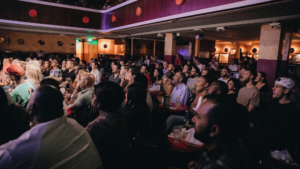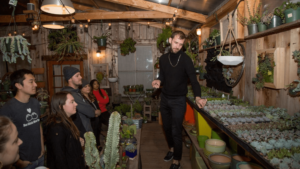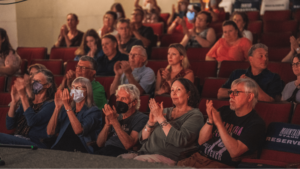In case you didn’t know, Creative Industry Hub and Media Match Magazine teamed up with Eventbrite to conduct an exclusive study about the economics of live events and the music industry.
Our findings, based on surveying over 500 music industry professionals, were recently published in a report called ‘Making Music and Money: How Live Events Are Shaping Incomes for the Music Industry.’
One of the headline findings was not a surprise: workers in the music industry reported that events were their biggest source of income and they expect this to grow in 2016.
What was surprising, is that they spent hardly any time promoting their own gigs or finding ways to capitalise on the importance of events.
Most music professionals will be aware that the recording industry has completely flatlined over the past 16 years since Napster introduced online piracy, and it’s a well-known fact that digital download sales and streaming commissions don’t pay anywhere near as much revenue as physical hard sales (such as vinyl and CD’s).
This is why the live event industry in music has grown so massively. Whereas gigs used to be about promoting albums, now it’s the other way round. Artists are recording to promote tours instead, but the good news is, there is a lot of money to be made from this, and if done properly, it’s an artist’s best chance of gaining fans and hitting the big time.
In my talk on ‘How To Break Through In The Creative Industries’ at Hey Stac’s last event in Leeds (you can watch the video here), I mentioned that not enough musicians are treating their craft as a business, when in fact, they need to start viewing their creations as something that can be sold.
It’s all well and good being born with ‘creative genius’ (nice if you have it!), but we all know the story of the amazing bedroom guitarist who may well create fantastic music, but he/she just can’t seem to turn it into a serious career, so he/she ends up working at Starbucks instead.
There are thousands of these types of people in the UK, sadly.
It’s a bit like James Caan’s classic saying. ‘The day you think of an idea is not the day you become a millionaire. It’s execution that matters. People that have a bad idea that execute it properly will be more successful than those with an amazing idea that don’t.’
So is being a creative genius the key to success? No. Only if you execute it properly.
For musicians, they need to accept that in the early days, spinning multiple commercial and creative plates is what will make an income and get them noticed. And one of those plates should be gigs.
Sadly, in the early days of an artist or band’s career, they don’t have the privilege of outsourcing their gig marketing to a big promoter like Live Nation or AMG.
But if they work harder on promoting their gigs, that day may eventually arrive. Really, the key take home from this is that artists need to change their entire perspective, realise the importance of promoting their own gigs, and do more of it.
With this change in mindset, there are a number of ways you can drive awareness and revenue from gigs.
Support a bigger band
Supporting small bands is easy. Look for a band in a similar genre that has a much larger following than you, and contact them through their website or get in touch with their manager, which should be easy to do with a quick Google search. The key is to find a band with a large social following that brings good audiences and has a similar sound.
Get involved in their social media activity to raise awareness, and do social media competitions on stage to gain followers during gigs. Also network, and find out what festivals they’re playing and see if you can network your way into new opportunities.
Ultimately, networking is the biggest key to success in the music industry.
Contact music festivals or organise one!
Contact every music festival and ask for a small slot during the day. I did this 6 years ago with my old band, Identity Thief and we weren’t even that well known, however I managed to secure two festival performances, which did wonders for our fan base. And if that doesn’t work, contact a few bands in your area and team up to do a big event yourself.
These kinds of events are great for pulling the local community together, and it’s easy to get local newspaper coverage when you’re doing something a bit different that stands out and benefits people’s wellbeing.
If you can pull a big headliner in, even better! Again, if you don’t make contact with people and ask, you certainly won’t get.
Do a charity concert
People like to donate to charity, so maybe you can link up with a local charity and hold a gig where all proceeds go to them. Again, this is a great way to tap into new social media audiences, and get press coverage if done properly. Maybe you could do a theme night or do something a bit different or radical that will get people’s attention.
A few years ago, my previous band got invited to play our first ever gig at a big charity concert, and the theme was ‘neon,’ so everybody brought glow sticks and wore fluorescent clothing, and it was really surreal playing on stage and seeing loads of luminous lights in the audience! But it was packed out, as people thought it was different.
Partner up with brands
Partnerships really are the buzzword in the music industry. Just look at the amount of artists that have signed partnerships with companies. Maybe you can find a local business that wants to support local art and music, and strike up an advertising agreement with them. This is a great way to do gigs with a purpose and build a new fanbase.
Changing your perspective
Instead of just booking gigs, how about booking gigs with purpose and creating an action plan?
It’s really important to change your perspective about gigs.
It’s all well and good playing loads of pub gigs and hoping that the A&R guy from Virgin Records will turn up, but it’s probably not going to happen.
So to complement your time doing this sort of thing, you also need to spend a lot of time researching and finding more smart business opportunities that will benefit you.
Because time spent playing a gig in a pub is time wasted if you could have been supporting a band with a big fan base instead, or playing at an event where you know industry professionals will be there.
So instead of just booking gigs, how about booking gigs with purpose and creating an action plan?
Build a career
And last but not least, make money out of gigging and music! Because if you don’t hit the big time, there are plenty of artists and bands out there who aren’t famous, but have a small fan base and make a good living out of it.
For example, Dave McPherson from InMe does really well out of his solo acoustic gigs, so there is inspiration to take from that.
I hope that helps!
Download ‘Making Music and Money: How Live Events Are Shaping Incomes for the Music Industry’ for more insights and expert advice for artists and music professionals.





